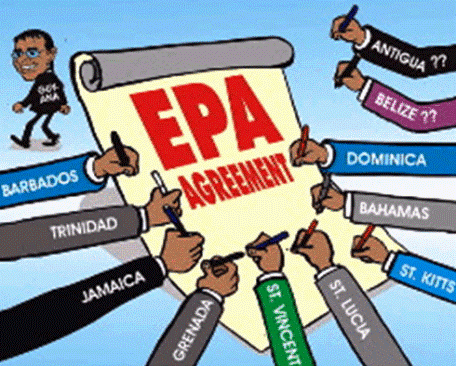
CaribWorldNews | Aug. 10, 2010
That EU Cariforum Economic Partnership Agreement
It is unlikely that you have ever heard of Christofer Fjellner from Finland or Peter Sratsny from Slovakia. It is however possible that you may know of José Bové, the environmental campaigner who rose to fame in France when in protest he destroyed a MacDonalds burger restaurant and more likely still you will recognise the name of Europes former Development Commissioner, Louis Michel.
What these individuals, plus twelve more and four substitutes have in common is that they are all Members of the European Parliament who have been named formally as its members on the Joint EU Cariforum Parliamentary Committee; an institution of the EU Cariforum Economic Partnership Agreement (EPA).
This and other developments make clear that Europe, unlike the Caribbean, is moving forward to establish the bodies and appoint the individuals that will from its perspective manage the implementation of the trade agreement.
Europe has also begun to consider who its representatives might be on the EU-Cariforum Consultative Committee: the civil body that will advise Ministers and officials on implementing the EPA.
As early as last November, the European Council published a decision calling for expressions of interest from EU organisations wishing to be involved. This overall Consultative Committee will consist in total of 40 standing members representing organisations from civil society of which twenty five will be from organisations located in Cariforum states and fifteen from organisations in the EU drawn from categories that include social and economic partners, the academic community and non-governmental organisations, including development and environmental organisations. The European Economic and Social Committee (ECOSOC) will serve as its secretariat.
While the final choice of who will sit on the committee as a whole will come down to EU and Cariforum officials meeting as the Cariforum-EC Trade and Development Committee, which will also agree a list of observers, it is clear that Europe is now far ahead in selecting who will influence decision making on the EPA.
In contrast, little is known about Caricoms thinking as to whom from the Anglophone part of the region will sit on the Joint Parliamentary Committee or the consultative committee. Other uncertainties exist. A draft road map has been produced but its content has not been widely shared and most Caricom nations have yet to name an individual to be responsible nationally for EPA implementation.
At the heart of this failure to move forward is the inability of Caricom and the Dominican Republic to agree at an all Cariforum level who the EPA co-ordinator should be, how a Cariforum regional fund that the EU can use as a disbursement mechanism for EPA related assistance might function, or how to resolve the fact that most Caricom customs regimes have failed to implement EPA related arrangements whereby regional preferential access has to be granted to exporters from the Dominican Republic.
As a consequence all that has been put in place with Europe by Cariforum as a whole are the overall rules of procedure for the joint Council of Ministers - the body that will govern all EPA decisions – and for all other subsidiary bodies.
Meeting at a high level in Madrid in June the EU and Cariforum that agreed these rules, Cariforum named Senator Maxine McClean, Barbados Minister of Foreign Affairs and Foreign Trade, as its High Representative to the European Commission until December 2011.
The problem is that in the English speaking Caribbean, in contrast to the Dominican Republic, there is a growing sense that despite the ECs best endeavours to convince popular opinion otherwise, the EPA belongs to a way of thinking that many leaders and academics have suggested is wrong.
In many Caricom nations the view that freer trade and regional integration would deliver private sector led economic growth has faded since the EPA was signed in 2008 and the world plunged into recession.
In part this is because the financial crisis brought into sharp relief the numerous challenges that small island states in the English speaking Caribbean faced prior to the signing of the EPA. However, it also reflects the high level criticism of the agreement by some Caricom Heads of Government following its signing and a range of wider concern about the extent to which trade agreements have value overall value for small economies that have not been able to successfully integrate. It is also true to say that differences between key individuals have not helped make made the process any easier.
The consequence of all of this is widespread uncertainty about the EPA in the English speaking Caribbean that contrasts strongly with the more positive approach taken by Government and the private sector in the Dominican Republic.
Finding ways forward to breathe life into the EPA are, as a consequence, complicated.
What is needed now is for the larger private sector in both the Dominican Republic and the Anglophone Caribbean to come together to with the regional trade associations that embrace the regions as a whole to take greater charge of the process by asking questions about what is happening in the region; ensuring that they have a voice on the consultative committee; and finding ways to ensure that their concerns are heard by those who will sit on the joint parliamentary committee.
If the EPA is to benefit the region, Europe and Cariforum and the array of new bodies that have been created, should concentrate on finding ways to demonstrate the agreements value in practical terms, encourage creativity in thinking about the opportunities the EPA might offer, and establish a central role in any such outreach for business support organisations in the region. Without this the EPA will have a structure but in practical terms will remain for the private sector dead in the water. - By David Jessop/Special To CWNN
David Jessop is the Director of the Caribbean Council and can be contacted at david.jessop@caribbean-council.org. Previous columns can be found at www.caribbean-council.org.